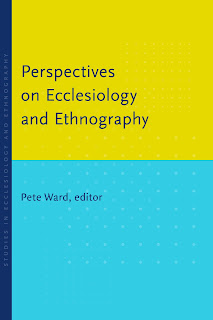At the recent meeting of the American Academy of Religion I had the pleasure of participating in a session on ecclesiology and ethnography, engaging some of the contributors to an excellent new book edited by Pete Ward: Perspectives on Ecclesiology and Ethnography (Eerdmans, 2012). This has since been complemented by a subsequent volumed edited by Christian Scharen: Explorations in Ecclesiology and Ethnography (Eerdmans, 2012) in which (full disclosure) my friend Mark Mulder and I have a co-authored chapter, “Understanding Religion Takes Practice: Anti-Urban Bias, Geographical Habits, and Theological Influences.”
The AAR session included presentations from John Swinton, Mary McClintock Fulkerson, Luke Bretherton, and Elizabeth Phillips, all drawing on their chapters in the book. Here I reproduce the notes of my response as a way of highlighting this new interdisciplinary conversation and, I hope, as a way of extending and expanding it.
+++++
Ecclesiology and Ethnography: A Response
John Swinton’s wonderful chapter in this book names a question I’ve heard often. When, in different contexts, I used to explicate the social imaginary implicit in Pentecostal worship and spiritual practice, inevitably someone from the audience would ask: “Just where can I find a Pentecostal church like you describe?” After several occasions with no reply, I finally came up with a stock answer: “It’s in Amos Yong’s head!” Then I would do some hand-waving about my description being “aspirational” and try to move on. (This will give you some idea of just why I had to leave the Assemblies of God.)
It wasn’t until I read Chris Scharen’s
SJT article on “ecclesiology asethnography” that I was able to articulate just what was wrong here and began to turn the corner in my thinking about ecclesiology. So I am profoundly grateful for this volume that is the occasion for our discussion today because I think, like our presenters, it does a fantastic job of articulating a big-tent approach to this emerging conversation between ecclesiology and ethnography.
And I should admit that I came to the book with some skepticism. To be perfectly honest, I was expecting a lot more Paul Tillich and Don Browning, if you know what I mean. That is, I was expecting a “correlational” approach that would offer “neutral” checks and balances to the “biased” claims of theology, with the social sciences “explaining” what worshipers were doing in “objective” categories. But as you’ve just heard, the conversation is much more nuanced than that. Given the impossibility of actually “responding” to our panelists in this time, permit me to just extend this conversation by engaging a few themes that have emerged.
1. Ethnography and liturgical priority
I loved Mary McClintock Fulkerson’s critique of “didacticism” and the “inadequacy of propositional theology” for making sense of the complexity of lived religion in congregations (126-127). I also think she’s absolutely right that the core intuitions of the ecclesiology-and-ethnography project should upset the usual hierarchies of the theological curriculum. Far from being an “application” appendix, “practical” theology should be the centering discipline, with biblical studies and systematics as the “grammars” of our worship.
In this respect, I think we could pursue a more robust account of Christian worship as a kind of irreducible know-how that precedes—and even, to some extent, eludes—our know-whats. You can run this account either through Wittgenstein or Charles Taylor or Robert Brandom or Pierre Bourdieu—I won’t do so in my brief time here. Maybe I could suggest a metaphor, however: in poetry criticism, Cleanth Brooks introduced something of a principle: “the heresy of paraphrase.” The point is that what a poem means in ineluctably bound up with its form which carries a meaning that is irreducible and thus cannot be paraphrased in any other propositional form. It seems to me that the know-how of Christian worship—and congregational practices more broadly—resist paraphrase. This puts practical theology, and even the ecclesiology-and-ethnography project, in a region of temptation: the temptation to paraphrase. And now we’re on exactly the terrain of Bourdieu’s The Logic of Practice. (I unpack this problem in more detail in James K.A. Smith, Imagining the Kingdom: How Worship Works [Baker Academic, 2013], ch. 2.) Fortunately, I think the priming intuitions of your project already sense this tension. But we also need to remember that ethnography is still propositional, constituted by the epistemological “break” that Bourdieu emphasizes is a socialbreak.
2. When and how do functional theologies trump “official” theologies? Or: when and how do performedtheologies trump articulated theologies?
At the end of her very helpful essay—which is part lit review, part case study—Elizabeth Phillips concludes “that the deeply problematic eschatology of Christian Zionism so alters their Christology and ecclesiology as to disconnect them from the Christological and ecclesiological resources that are necessary for well-formed Christian social ethics” (104). This left me with some nagging questions, not because I think she’s wrong, but precisely because I think she’s right:
- At what point do the functional theologies of a congregation—which can only be detected with an ethnographic radar, so to speak—trump whatever “official” theologies that might define them as Christian?
- · In other words, could ethnographic description ever enable us to theologically evaluate congregations vis-à-vis ecclesiological and liturgical norms?
- · Or, to put it even more strongly: to what extent are we willing discuss the parameters for a Catholic theological anthropology, and thus consider norms for practice that exceed particular congregations? Who could do that? From where?
- · Perhaps this is all just a way of asking: Can ecclesiological ethnography names idolatries and heresies?
3. Let’s invite the sociologists
Notice who is
not here: sociologists of religion. Phillips is right that anthropologists have been much more open to this conversation. (See, just for one example, the Fall 2010 volume of the
South Atlantic Quarterly for a conversation between anthropologists and theologians.) But then anthropologists, at least after Geertz, have been on the “soft” (or hermeneutic) side of the social sciences and long had a deep-sense of the value-laden nature of observation. Sociologists—while not as bad as psychologists—still tend to aspire to “scientificity” in ways that get bound up with myths of objectivity.
Yet, more and more, sociologists are taken to be the authoritative voices that distill for us the essence of the church. And most of that is based on research conducted by quantheads who lack the sort of theological nuance that our panelists have articulated. Instead, they reduce the church to an organization like others, offering “religious” goods and services, but therefore almost entirely understandable within paradigms for understanding other organizations, including rational choice theory and economic modes of analysis (see: Rodney Stark and his ilk). With those assumptions, ecclesiology is pretty much irrelevant. (And it gets really scary when theologians start looking for ‘scientific’ cachet by hitching their wagon to such social science approaches. Cue your favorite John Milbank quote here.)
What I find refreshing and promising about this conversation is its refusal of such reductionism, without floating off into aspirational idealism. As Bretherton summarizes it,
The broader point to draw for the relationship between ethnography, ecclesiology, and political theory is that the church cannot be read as simply a microcosm of broader political processes and structural forces: it has its own integrity. Yet neither can an analysis of the church be separated from how it is in a relationship of codetermination (and at times co-construction) with its political environment (161).
That seems just right to me: an anti-reductionism vis-à-vis sociology; an anti-gnosticism vis-à-vis theology. But you might be surprised how little this would be understanding at SSSR. I would encourage you to consider inviting Christian sociologists of religion into the “ecclesiology & ethnography” conversation, perhaps even trying to host a session at SSSR, in order to cross-fertilize these conversations. We might thereby expand the disciplinary conversations, building a collective of scholars who undertake ethnography, as John Swinton suggests, for Jesus, and for his body.







